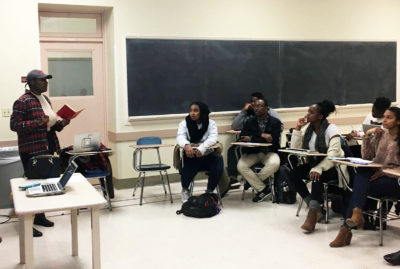
In October, a CNN team went to Libya and filmed a dozen men being auctioned off for as little as $400. On Nov. 13, they published an interview with 21-year-old Victory from Edo State in Nigeria. This was the video that began the meeting.
After seeing news of refugees being sold as slaves before they could reach Europe to start a new life, many students were appalled to the point of disbelief.
On Tuesday evening, a community of Boston University students gathered together with one purpose in mind — to respond to the recent news of refugees being sold as slaves in Libya.
The meeting was called by the BU African Student Organization to create a space for people to express their outrage about the Libyan slave trade and to develop a local action plan. They plan on calling their official group “Liberation for Libya.”
“When I first saw the pictures and videos on Twitter almost two weeks ago, I immediately closed it because I was like, ‘This is fake. This is clickbait,’” said Sernah Essien, a senior in the College of Arts and Sciences and president of Umoja BU — a club that engages students with black culture. “I didn’t think twice about it until I saw the actual CNN video report.”
Lola Adeosun, co-president of BU African Student Organization and CAS senior, said she was horrified. Although she was aware that human trafficking is still present in the United States and other parts of the world, she said seeing “an auction block, to see people bid on and bought for $400, I was appalled.”
The first reaction of these students was to take to social media and alert their friends, families and classmates of the situation that was not getting a lot of coverage by American news.
“Some of you are more upset that your artist didn’t get a Grammy nomination than you’re upset about black migrants being sold for $400 in Libya in 2017,” Lornex Rono, CAS senior, wrote in a Nov. 28 Facebook post.
Rono is a member of the BU Stability, Empowerment and Rights in Africa organization, a student-led group that dedicated to human rights and empowerment in Africa. They also look for ways to engage the BU community with African politics and culture.
To start the meeting, Adeosun presented videos and facts about the slave trade in Libya, possibly extending into other countries. She also made sure to present information on Libya itself.
“It’s so easy to demonize this country, but it’s more than that,” she said.
After discussing the details and origins of the slave trade, the group moved into how they could make a difference. Their first obstacle was outreach. Several audience members pointed out the lack of support from other students of other races and ethnicities.
“We need to change the narrative from an ‘African’ problem to a ‘global’ problem,” said CAS junior Tiara Cedano.
Although the group was working toward the same goal, with all of these different people coming from different backgrounds, there was a constant stream of debate about each aspect of the proposed action plan.
Attendees were proposing ideas on how to deal with the Libyan slave trade at the local level. Some ideas mentioned were to contact local organizations and university faculty, hold protests to bring awareness to BU students, write letters, fundraise, distribute finances, get resources to travel to Libya and create a social media campaign.
Essien and Adeosun guided the discussion to implement a plan in which they would create four committees specifically dedicated to awareness.
“[The meeting] was very productive,” Cedano said. “The community has to come together to spread awareness and take action. We all have a social responsibility and just because we’re not directly connected doesn’t mean we shouldn’t care.”
The group will continue to contact people in authority and gather members during the last couple weeks of the semester to garner as much support for the cause as quickly as possible.
“They might be unsure of exactly what the next steps will be or where it will ultimately go, but they have high hopes,” Essien said. “We have too much privilege and too many resources to be able to see some of this, feel heartbroken and have it continue without doing a single thing about it.”
























































































































